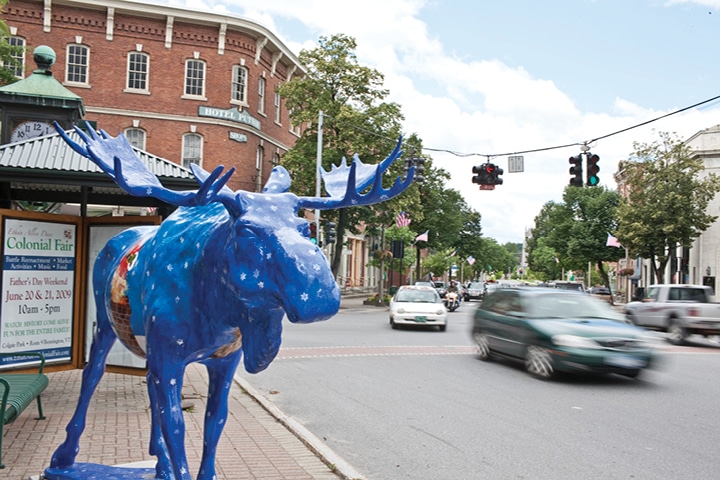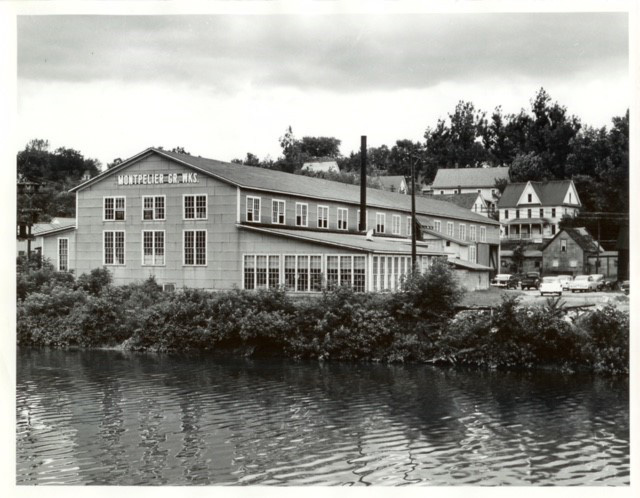
by accdWebMaster | Sep 18, 2020 | Communities, Food & Beverage, Incentives/Financing/Programs, Nonprofits
Skinny Pancake, a local creperie, began a program called Shift Meals to provide food relief to its workers when the restaurant’s multiple locations were shuttered at the start of the pandemic. Soon Shift Meals was partnering with the Vermont Foodbank, which purchased 20,000 meals from the program, according to NBC5. The program quickly grew: Shift Meals director Jean Hamilton told WCAX that since April, they’ve given out over 50,000 meals. She says the program was the catalyst for funding statewide restaurant-based food relief with federal CARES Act money. In July, Seven Days reported that the state had allocated $5M for a new program called Everyone Eats! The hope is that by the end of December, Everyone Eats! will have distributed 15,000 meals a week to hungry Vermonters.
Brattleboro is the first Vermont town to pilot the new program. Stephanie Bonin is the director of the Downtown Brattleboro Alliance and of Everyone Eats! in Brattleboro. She told The Commons about the program’s “three-pillar” approach: a food distribution system that connects local growers who provide farm fresh ingredients with local restaurants that create delicious takeout meals to feed hungry residents of five southern Vermont towns, free of charge.
Everyone Eats! leverages CARES Act funds—which are federal funds targeted at businesses negatively impacted by the COVID-19 pandemic—to engage local restaurants in making to-go meals for anyone in Brattleboro, Guilford, Vernon, Dummerston, or Putney, Vermont experiencing COVID-related unemployment, underemployment, homelessness, or other challenges. Over 10,000 meals were distributed Monday through Thursday throughout August, with nine Brattleboro restaurants providing a total of 650 meals per day for at least four weeks.
Bonin told NBC Nightly News recently that she ’s talked to restaurant owners “crying over the phone [about] how much this means to them.” She told the Sunday TODAY show, “This is huge for Brattleboro and … for the feeling of community that COVID took away from us.”
The program also boosts the local economy by connecting growers and restaurants that hadn’t worked together before, strengthening the local food system. That’s no coincidence—Vermont has consistently ranked #1 on the national Locavore Index for its commitment to local food. Farms across Vermont are feeling the positive impact of programs like Shift Meals and Everyone Eats! Farms are seeing increased business during a downtime and creating additional partnerships to draw more participants into the local food system. Newport’s Bluffside Farm, according to VT Digger, opened a portion of its land as a community garden, with local residents tending plants donated by area farms.
The urgency of food insecurity has refocused Skinny Pancake’s business model. Co-founder Benjy Adler recently told Seven Days that his business is now geared towards strengthening Vermont’s local food system by continuing Shift Meals, and also with two new initiatives, one aimed at supporting BIPOC growers and another a collaboration with local farms. Meanwhile, VT Digger reports that the State of Vermont is just about ready to launch Everyone Eats! Statewide, with ten Everyone Eats! hubs now launching, expecting to serve over 20,000 meals per week into December.
At a time of social distancing and deep uncertainty, Vermont’s tightly knit local food system has gotten even stronger by focusing on local agriculture to feed neighbors in a crisis.

by accdWebMaster | Jun 15, 2020 | Communities, Quality of Life, Vermonting
An Essex landlord is giving his tenants a break by dropping rent prices, understanding that lost hours mean financial struggles for everybody, himself included, according to Seven Days.
An art teacher at Johnson Elementary School, missing her students, has put together art kits for all 170 of them, giving them a creative outlet during long hours at home. She told MyChamplainValley it was a community effort – a neighbor freed up garage space and community arts organizations helped with supplies.
University of Vermont student Taran Catania donated her graduation gown to Gowns4Good, an initiative started by a health care worker friend, collecting graduation wear to protect those on the front lines.
For Vermont’s musicians, gigs have ebbed away, gutting the performance season. But now there’s plenty of time to use their talents to help the community, as a group of local musicians did by putting out an album in support of the Vermont Foodbank. Proceeds from Music to Feed the Soul go directly to the food bank.
Local newspapers are businesses too, and when money is tight, ad revenue slips. One Randolph resident is helping provide needed revenue by buying weekly ad space for jokes. VTDigger reports the jokes are intended to cheer up the community and shore up revenue for the Herald of Randolph.
According to Seven Days, almost one in four Vermonters is worried about having enough to eat. Fortunately, Vermont’s communities are stepping up to feed their neighbors, from giving away homemade bread to helping each other grow produce at home to restaurateurs providing free meals to frontline workers or those struggling with lost wages.
It may feel like individuals can’t do much to help, but by working together, they can make a huge impact. A group of Vermont chefs have put together an e-cookbook to raise profits for the Restaurant Strong Fund, providing $1,000 grants to restaurant employees who have lost their jobs due to COVID-19, according to the Rutland Herald.
Grand Isle’s Arbor Farmstead first began selling its produce online in lieu of farmers markets, but when people began asking to feed neighbors who needed food more than they did, owner Alisha Utter began giving them the option to fill food baskets for those in need.
Similar to Little Free Libraries, Little Free Pantries have begun popping up in Burlington neighborhoods, according to Seven Days. They’re put up by nonprofit ONE Good Deed Fund, and aim to connect people in need with no-questions-asked essentials.
Every Vermonter knows winter heat never strays far from our minds; one Jericho father and his son are collecting firewood to spread around the community, ensuring financial strain doesn’t exacerbate next winter’s chill.
Vermonters pull together in times of turmoil and stress. Together, Vermont’s communities will get through the COVID-19 crisis.
by accdWebMaster | Jun 10, 2020 | Communities
Supporting Local Businesses and Addressing Community Needs
Vermont and many other states have built creative strategies to access state or federal funding to pay restaurants to provide meals to those in need. This strategy leverages outside funding to meet immediate community needs during the crisis while and helps local restaurants and food producers continue production and retain staff. California launched “Great Plates Delivered: Home Meals for Seniors.” This program delivers three prepared meals daily to seniors enrolled in the program. Restaurants that provide the meals are reimbursed using FEMA funding.
Building Economic Resilience and Recovery
As businesses and restaurants begin their phased restart, communities are considering strategies for retail and food sales while maintaining public health and safety. Tampa, FL built a “Lift up Local” Economic Recovery Plan for businesses to expand their outdoor capacity by temporarily allowing retail sales and dining on sidewalks, parking lots, designated closed roadways, and other private outdoor areas. The plan also permits temporary “parklets” for outdoor dining and sidewalk sales. Vermont’s Department of Housing and Community Development partnered with the Vermont Agency of Transportation to develop a similar guide to help downtowns expand outdoor seating.
A Toolkit for Local Response and Recovery
As communities navigate restarting, Strong Towns, a national organization rethinking our approach to community development, resilience, and leadership, has developed a “Local Leaders Toolkit” with strategies for response, recovery, and building strong towns into the future.
Vermont’s Local Support and Community Action Team—part of the state’s Economic Mitigation and Recovery Task Force—is working to provide Vermont communities with best practices for recovery. By connecting with communities across the globe they are building a toolkit of resources that can be replicated and shared across Vermont.

by accdWebMaster | May 13, 2020 | Communities
Meeting Immediate Community Needs
A Community Center turned Virtual Hub: The Marlboro Alliance and affiliated Marlboro Community Center are working together to provide wrap-around support for their neighbors. The Community Center is bringing residents together virtually with weekly “coffee hour” Zoom calls; offering curbside pickup for local food and farm businesses; providing baked goods and prepared soups and meals; and helping residents connect through free public Wi-Fi from the parking lot. A portion of proceeds from food sales and curbside pickup benefit the Marlboro Community Fund, managed by the Alliance and started in the wake of Hurricane Irene, that offers $200 to households with emergency needs.
Communities can find more resources and best practices to support immediate community response at the Vermont COVID-19 Community Response Toolkit.
Supporting Local Businesses
48-Hour Gift Card Challenge: The Downtown Brattleboro Alliance raised $57,000 in two days to support local businesses and families in need with a 48-hour gift card challenge. Every online gift card purchased from a downtown Brattleboro business was matched dollar-for-dollar by local donors. Matching gift cards were distributed via the Retreat Farm’s Pick-Up-A-Pantry Program. The Alliance created a guide on how to implement a community challenge.
Building Economic Resilience and Recovery
Building Local Capacity for Business Recovery: Montpelier Alive and the Montpelier Development Corporation have partnered with the Center for Women and Enterprise to hire Jean Kissner as their Montpelier Recovery Navigator to work with local businesses over the next year to help navigate recovery options and adapt to the new business environment.
Over the coming weeks and months Vermont communities will step forward with innovative and far reaching plans to support and sustain their businesses and residents, solving the immediate problems and laying the groundwork for a more sustainable future.

by accdWebMaster | May 13, 2020 | Brownfields, Communities, Environment, Incentives/Financing/Programs
The brownfield clean-up funding will support asbestos mitigation and soil remediation at the property to prepare the site for redevelopment. The redevelopment envisions the demolition of smaller structures and outbuildings, construction of paved parking areas and driveways, and renovation of the impressive former granite shed.
The construction, clean-up, and redevelopment of the site is being managed by Connor Contracting, Inc. (CCI), a 30-year-old general contracting company based in Berlin and St. Albans, Vermont. CCI’s affiliate, Connor Brothers Redevelopment Company, LLC, purchased the property in February 2020. The Connor companies are owned by Fred, Steve, Mike, and John Connor. Prospective tenants for the 15,000 +/- square foot building – 1.6-acre site are invited to call Fred Connor at (802) 223-3843.
Vacant today, this property has a 100+ year history as a granite manufacturing facility. Once remediated, the property is anticipated to be used for commercial or mixed-use (residential/commercial) development. Making an initial investment through the RLFs, the property is expected to leverage $2 million in additional value and create up to 60 jobs once complete. The project will also make great use of existing infrastructure on the property to save both time and costs.
“NRPC is thrilled to contribute brownfields funds towards the revitalization of the historic industrial area along Barre Street in Vermont’s capital city,” said Greta Brunswick, Senior Planner at Northwest Regional Planning Commission.
“I am eager to see this transformation; it has been some time since the ACCD’s Brownfield Initiative has been able to support clean-up at a Central Vermont site. The economic development potential of this project is incredible. We are grateful to Connor Contracting for advancing this project, and for our on-going relationships with state and federal remediation partners,” said Kristie Farnham, ACCD Director of Business Support and Brownfield Program Manager.
“EPA is committed to supporting Brownfields cleanups like this one at the former Montpelier Granite Works site that result in a cleaner environment and healthier local economy,” said EPA New England Regional Administrator Dennis Deziel. “We’re proud to work with our dedicated state agency partners in Vermont who share our commitment to ensuring Brownfields sites are transformed into places that can benefit their communities once again.”
“VTDEC is excited to see the cleanup move forward at this site and for this former industrial property to be put back into reuse. This project has been a great example of collaboration between multiple state partners including several regional planning commissions who contributed EPA grant funding for the environmental assessment work and cleanup planning,” said Kim Caldwell, Environmental Analyst at Vermont Department of Environmental Conservation.
About the Brownfields Initiative
ACCD’s brownfields program is funded, in part, through a grant from the EPA Brownfields Program. For more information on redevelopment of a brownfields site, please visit https://accd.vermont.gov/economic-development/funding-incentives/brownfields-initiative
Connor Brothers Redevelopment Company, LLC is enrolled in the Brownfields Reuse and Environmental Liability Limitation Act (BRELLA) Program. This program provides applicants with protections from certain environmental liabilities as well as access to funding and other incentives. For more information, please visit https://dec.vermont.gov/waste-management/contaminated-sites/brownfields
About NRPC
The Northwest Regional Planning Commission (NRPC) is a governmental organization representing Franklin and Grand Isle Counties in northwest Vermont. Commissioners appointed by local governments serve on the Board of Commissioners and guide the work of NRPC, which includes regional land use issues, transportation priorities, emergency preparedness, economic development, natural resource issues, public/private sector cooperation, and review of Act 250 projects. For more information on NRPC, visit www.nrpcvt.com.
About VEDA
The Vermont Economic Development Authority (VEDA) is Vermont’s economic development finance lender. VEDA’s mission is to contribute to Vermont’s economic vitality by providing a broad array of financing programs to eligible businesses that create jobs and help advance Vermont’s public policy goals. VEDA offers a wide range of low-cost lending options. VEDA partners with the Agency of Commerce and Community Development (ACCD) and the Department of Environmental Conservation (DEC) to manage the State of Vermont’s Brownfield Revitalization Fund. VEDA makes loans from the Fund as approved by ACCD to finance the completion of DEC approved Corrective Action Plans for Brownfield sites throughout Vermont, enabling companies to put properties back into productive use and frequently help revitalize downtowns and other sites. For more information about VEDA, visit https://www.veda.org/.
About VTDEC Brownfields Program
The Vermont Department of Environmental Conservation (VTDEC) encourages brownfield reuse projects as a means of accomplishing positive environmental and human health impacts while advancing sound land-use practices. Reuse of historically productive properties supports sustainable development trends and promotes community and economic growth. The VTDEC Brownfields Program works to provide developers with tools to help deliver projects in a safe, timely, and cost-effective manner, focusing on three areas: limitation of environmental liability; technical assistance; and financial assistance. Our Brownfields Handbook describes how to navigate a variety of brownfields redevelopment.




